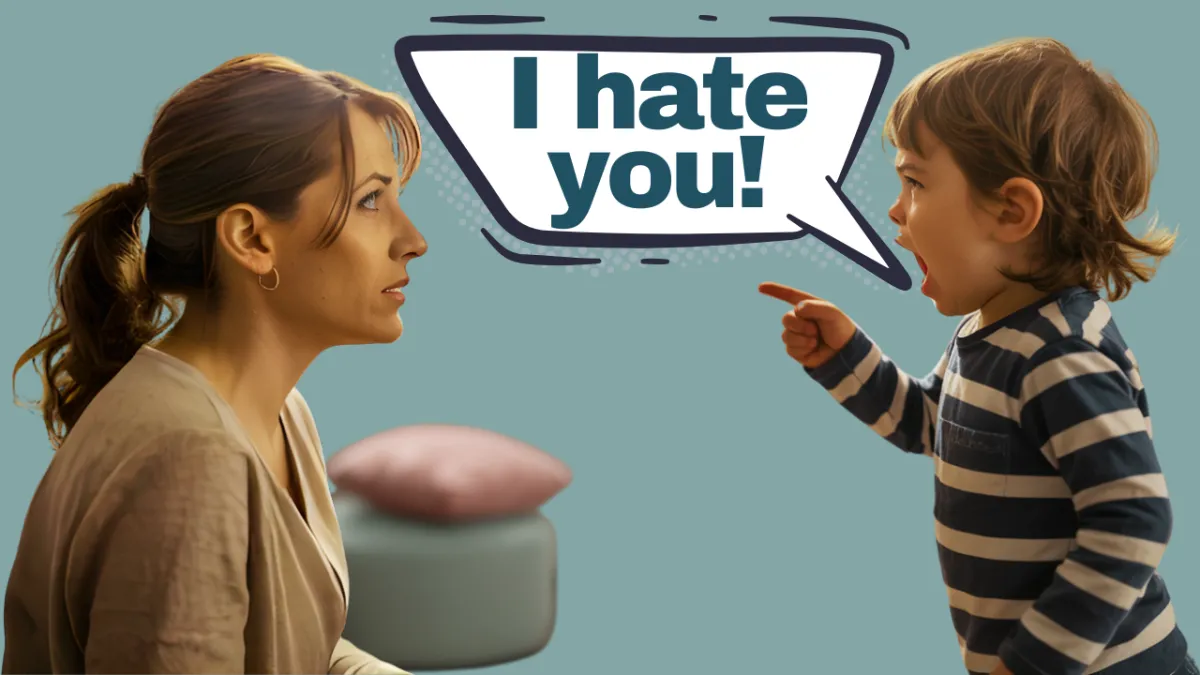
How to Respond When Your Child Says, "I hate you!"


Your child has just said those dreaded words: "I hate you." You’re left reeling—shocked, hurt, maybe even a little furious. If this has happened to you, know this:
You are not alone.
You are not a terrible parent.
And your relationship with your child is not ruined.
In fact, this moment—painful as it feels—can actually become a turning point in how you connect with your child.
I’m Dr. Lindsay Emmerson, psychologist and mom of four, and today I’m sharing five proven strategies from my 5 C’s parenting framework that will help you navigate this tough moment with confidence, calm, and compassion.
Wait until you hear strategy number four—it’s a complete game-changer that most parents miss entirely.
1. Communication: Avoiding Strong Words
One thing I talk to parents about often in my coaching program is being intentional about the words used in your household. Words like "hate" are emotionally loaded and, over time, can create an unnecessarily harsh emotional tone.
By modeling softer but still expressive alternatives, you're guiding your child to articulate their feelings in a healthier way. For example:
Instead of: “I hate broccoli.”
Try: “I really don’t like the taste of broccoli.”
Why this matters:
It creates a more emotionally positive home environment.
It helps your child build emotional intelligence by identifying feelings more precisely.
It makes them less likely to say "I hate you" in future moments of anger or frustration.
This is a simple shift you can start practicing today that will pay off the next time tempers rise.
2. Consistency: Practice Unconditional Positive Regard
The second strategy comes from Carl Rogers’ powerful concept of unconditional positive regard. That means always showing your child love and acceptance—even when you're correcting their behavior.
It doesn't mean excusing poor behavior. It means seeing the behavior as separate from your child’s worth.
When your child says, “I hate you,” it’s easy to react defensively:
“How dare you speak to me like that?”
“You ungrateful little child…”
These thoughts are normal. But instead of saying them out loud, try this:
“I can tell you feel strongly about this. Let’s find a better way to say that.”
“Your feelings are important to me, but that was a very hurtful way to express them.”
This practice is hard—but it's powerful. When your child feels accepted even during correction, they’re more open to reflection, connection, and behavior change.
3. Choices & Checkpoints: Have Reasonable Expectations
In my framework, "Choices & Checkpoints" is about recognizing your child’s behavior through a developmentally appropriate lens. That includes moments when they lash out and say things like “I hate you.”
This behavior can be normal, especially if:
Your child is mimicking language from a friend or show.
They don’t yet know how to express intense emotions.
They’re simply overwhelmed.
When this happens, remind yourself:
“This is hurtful, but it’s developmentally normal.”
That little internal mantra can help you take a breath, reset your mindset, and approach the moment as a teaching opportunity instead of a personal attack.
4. Consequences: Gentle Correction (The Game-Changer)
Here it is—the strategy most parents overlook, and the one that can completely change how these moments play out.
Let’s say your child says something deeply hurtful. You’ve already:
Chosen not to escalate the language.
Reminded yourself it’s age-appropriate behavior.
Responded with calm correction.
Now what?
Give it space.
Say:
“Let’s circle back to this conversation later when we’re both feeling more composed.”
That’s it. No lecture. No punishment in the heat of the moment.
This approach is so effective because when your child calms down, they often return with their own apology or reflection—especially if you’ve modeled this behavior yourself. For instance, if you’ve ever raised your voice and come back later to say “I’m sorry,” they’ve already seen what healthy repair looks like.
Giving your child room to breathe shows them how to self-regulate, repair relationships, and trust your guidance, even in emotionally intense moments.
5. Check Yourself: Reflect and Reconnect
When your child says something as extreme as “I hate you,” it’s also a chance for you to take a compassionate look inward.
Ask yourself:
Have I been more short-tempered lately due to stress or exhaustion?
Has something in my tone or body language contributed to a breakdown in connection?
Have I been emotionally present with my child lately?
Sometimes the answer is yes—and that’s okay.
Every parent goes through moments where their stress spills into their parenting. Use this experience not to guilt yourself, but to gently course-correct and get back on track with your child.
Final Thoughts
Hearing “I hate you” from your child is heartbreaking—but it can also be a meaningful parenting moment if handled with care. By practicing the 5 C’s—Communication, Consistency, Choices & Checkpoints, Consequences, and Checking Yourself—you create a more emotionally intelligent, connected, and resilient relationship with your child.
I’d love to hear from you:
Has there been a moment when you used unconditional positive regard or gave your child space—and it made all the difference? Share your experience in the comments below.
Want more strategies like these?
Join my newsletter for weekly tips, resources, and answers to real-life parenting challenges. You're not alone—and you're doing better than you think.
